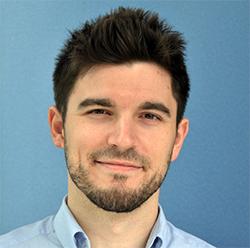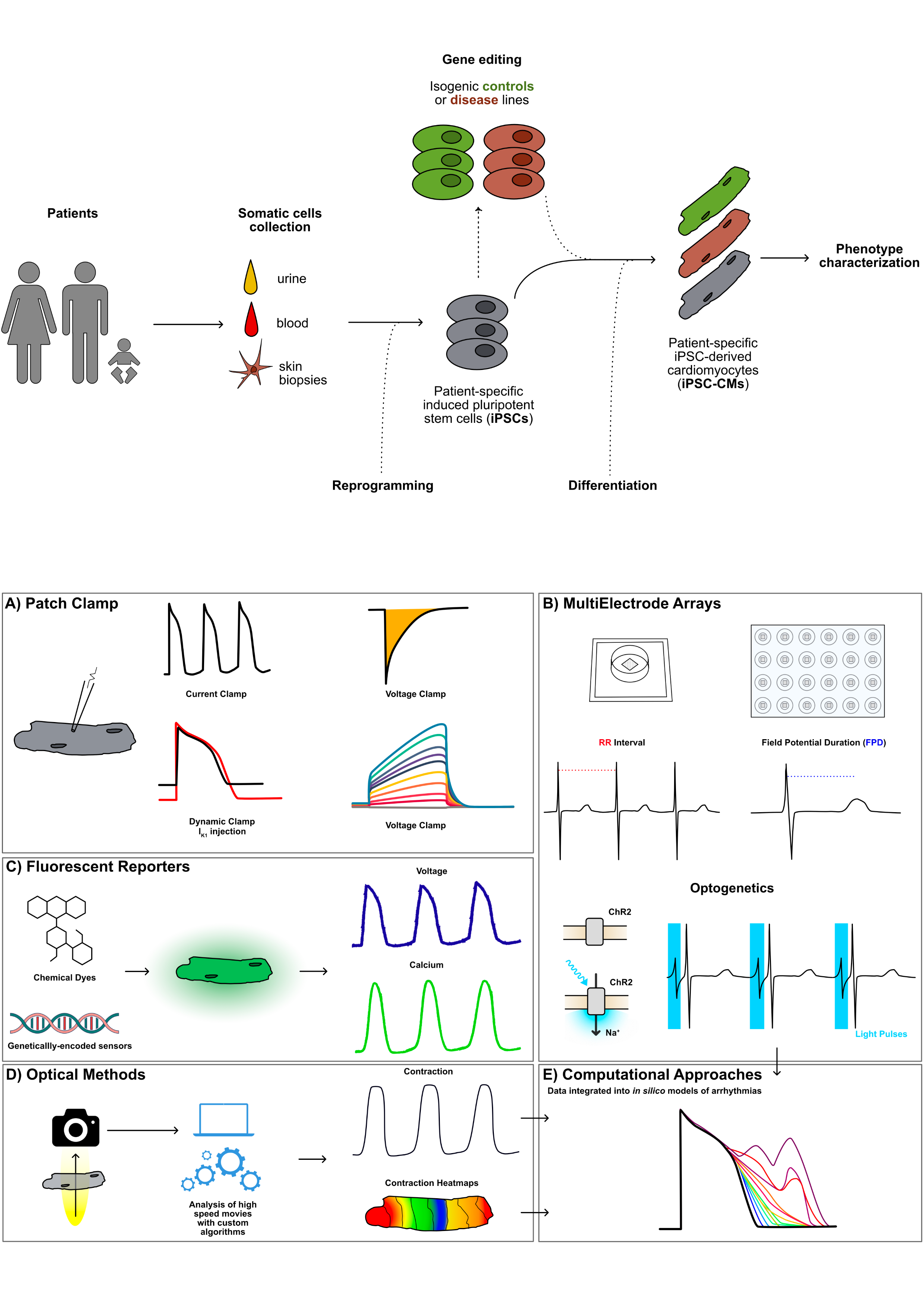Sala Luca, PhD
Assistant Professor of Physiology

lab 3015, building U3, tel. +39 02 6448 TBA
see also: PudMed, ResearchGate, ResearcherID: J-9532-2018, Google Scholar, Linkedin, Twitter
Background
Luca Sala obtained his PhD in Molecular and Translational Medicine at the University of Milano - Bicocca in December 2014 under the supervision of Prof. Antonio Zaza. His thesis work investigated the use of human induced pluripotent stem cell-derived cardiomyocytes (hiPSC-CMs) to study novel clinical aspects of calmodulinopathies and the role of genetic modifiers of disease in cardiac arrhythmias.
After the PhD, Luca Sala joined, as a postdoctoral researcher, the laboratory of Prof. Christine Mummery at the Leiden University Medical Center (LUMC), in Leiden, The Netherlands, from 2015 to 2018. His research activity further investigated the use of hiPSC-CMs as in vitro experimental models to study cardiovascular diseases and for drug screening purposes.
In 2018, with a Horizon 2020 Marie-Sklodowska Curie fellowship, Luca Sala returned to Italy and joined the laboratory of Prof. Peter J. Schwartz at the Istituto Auxologico Italiano IRCCS to investigate the mechanisms of drug-induced cardiac arrhythmias with hiPSC-CMs. In this role, he participated in national and international research consortia funded by the CARIPLO Foundation, the Leducq Foundation, the European Joint Program on Rare Diseases (EJPRD), the European Research Area Network on cardiovascular diseases (ERA-CVD), the Italian Medicines Agency (AIFA), the European Research Council (ERC), the Italian Ministry of Health.
In December 2022, Luca Sala obtained a research grant from the Ministry of University and Research (MUR) within the funding scheme NextGeneration EU - NRRP and joined the Department of Biotechnology and Biosciences at the University of Milano - Bicocca as Assistant Professor in Physiology (Italian Classification: RTD-A).
Keywords
Heart; Cardiac Arrhythmias; Electrophysiology; Induced pluripotent stem cells; Drug screening; Cardiomyocytes; Channelopathies; Disease modelling; Cardiotoxicity; Precision Medicine.
The activity is focused on the following research lines

Health
Cardiovascular diseases, Drug Discovery and Pharmacology, Genetic Deseases, Stem Cells and Regenerative Medicine
Infographics

Research interest
Our research interests are focused on studying the electrical and mechanical properties of cardiac cells at the cellular and molecular level in physiological and pathological conditions.
Our research activity is focussed on advancing our understanding on ion channels and on how their dysregulation affects the cardiac function in pathological conditions. We search for novel mechanisms underlying ion channel dysfunctions and how these can lead to congenital and/or acquired arrhythmias through electrophysiological and optical techniques.
We are concentrating our efforts on creating in vitro experimental models using hiPSC-derived cardiomyocytes (hiPSC-CMs) that are specific to individual patients and which can provide predictive readouts of the clinical conditions for precision medicine approaches to diagnosis and therapy for cardiac channelopathies.
Our lab also aims to identify novel molecules for the pharmacological treatment of cardiac channelopathies and cardiac arrhythmias, with drug evaluations performed in vitro in advanced human models to provide important insights into drug efficacy and safety, ultimately leading to the development of new or improved treatments for cardiac diseases.
Aside from investigating disease mechanisms and drug responses, our lab is also dedicated to advancing and integrating novel technologies to improve the throughput and reproducibility of in vitro cardiac electrophysiological evaluations.
Research projects
Active
● Leducq Foundation: Precision Medicine for cardiac channelopathies with human pluripotent stem cells 18CVD05. PI: Peter J. Schwartz
● SILENCE-LQTS: SGK1 inhibition as a novel therapeutic approach in Long QT syndrome. EJPRD20-188. PI: Lia Crotti
● Fondazione CARIPLO: "Biomedical Research Conducted by Young Researchers", grant No. 2019-1691. PI: Luca Sala
● Ministry of University and Research (MUR): NRRP Mission 4, “Education and Research” - Component 2, “From Research to Business'' - Investment line 1.2, “Funding projects presented by young researchers”. , Project No. 7743093D. PI: Luca Sala.
Non più attivi
● Horizon 2020 Maria Skłodowska Curie IF-2017: Project No. 795209. PI: Luca Sala. https://cordis.europa.eu/project/id/795209
Select articles
1. Lee, Y.K., Sala, L., Mura, M., Rocchetti, M., Pedrazzini, M., Ran, X., Mak, T.S., Crotti, L., Sham, P.C., Torre, E. and Zaza, A., 2021. MTMR4 SNVs modulate ion channel degradation and clinical severity in congenital long QT syndrome: insights in the mechanism of action of protective modifier genes. Cardiovascular Research, 117(3), pp.767-779. DOI: 10.1093/cvr/cvaa019
2. Gnecchi, M., Sala, L. and Schwartz, P.J., 2021. Precision medicine and cardiac channelopathies: when dreams meet reality. European heart journal, 42(17), pp.1661-1675. DOI: 10.1093/eurheartj/ehab007
3. Sala, L., Van Meer, B.J., Tertoolen, L.G., Bakkers, J., Bellin, M., Davis, R.P., Denning, C., Dieben, M.A., Eschenhagen, T., Giacomelli, E. and Grandela, C., 2018. MUSCLEMOTION: a versatile open software tool to quantify cardiomyocyte and cardiac muscle contraction in vitro and in vivo. Circulation research, 122(3), pp.e5-e16. DOI: 10.1161/CIRCRESAHA.117.312067
4. Schwartz, P.J., Gnecchi, M., Dagradi, F., Castelletti, S., Parati, G., Spazzolini, C., Sala, L. and Crotti, L., 2019. From patient-specific induced pluripotent stem cells to clinical translation in long QT syndrome Type 2. European heart journal, 40(23), pp.1832-1836. DOI: 10.1093/eurheartj/ehz023
International and national collaboration
National and International collaborations:
- Prof. Massimiliano Gnecchi, University of Pavia, IT
- Prof. Joseph C Wu, Stanford Cardiovascular Institute, US
- Prof. Bjorn Knollman and Asst. Prof. Brett Kroncke, Vanderbilt University Medical Center, US
- Prof. Lior Gepstein, Technion - Israel Institute of Technology, IL
- Prof. Carol Ann Remme, Amsterdam UMC, NL
- Prof. Katja Odening, University of Bern, CH
- Prof. Julia Gorelik, Imperial College London, UK
- Prof. Yoshinori Yoshida and Asst. Prof. Antonio Lucena-Cacace, Center for iPS Research & Applications (CiRA), JP
Sala's Lab – #SalaLab_BtBs
last update April 2023